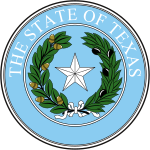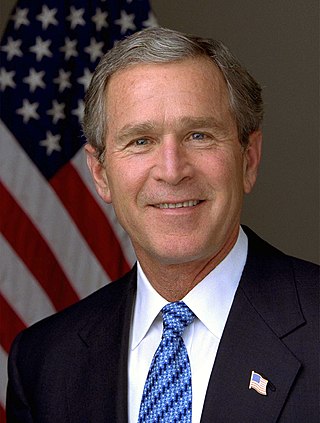
From January 19 to June 8, 2004, voters of the Republican Party chose its nominee for president in the 2004 United States presidential election. Incumbent President George W. Bush was again selected as the nominee through a series of primary elections and caucuses culminating in the 2004 Republican National Convention held from August 30 to September 2, 2004, in New York City.

From January 3 to June 3, 2008, voters of the Republican Party chose their nominee for president in the 2008 United States presidential election. Senator John McCain of Arizona was selected as the nominee through a series of primary elections and caucuses culminating in the 2008 Republican National Convention held from Monday, September 1, through Thursday, September 4, 2008, in Saint Paul, Minnesota. President George W. Bush was ineligible to be elected to a third term due to the term limits established by the 22nd Amendment.

This is the electoral history of Barack Obama. Obama served as the 44th president of the United States (2009–2017) and as a United States senator from Illinois (2005–2008).
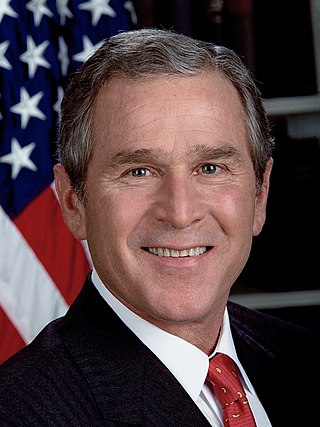
From January 24 to June 6, 2000, voters of the Republican Party chose its nominee for president in the 2000 United States presidential election. Texas Governor George W. Bush was selected as the nominee through a series of primary elections and caucuses culminating in the 2000 Republican National Convention held from July 31 to August 3, 2000, in Philadelphia, Pennsylvania.

The 2000 United States presidential election in Illinois took place on November 7, 2000, and was part of the 2000 United States presidential election. Voters chose 22 representatives, or electors to the Electoral College, who voted for president and vice president.
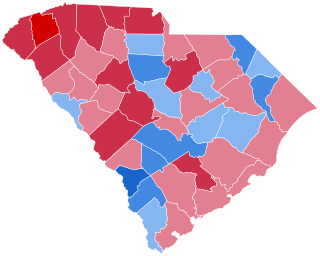
The 2000 United States presidential election in South Carolina took place on November 7, 2000, and was part of the 2000 United States presidential election. Voters chose 8 representatives, or electors to the Electoral College, who voted for president and vice president.

The 2000 United States presidential election in Tennessee was held on November 7, 2000, and was part of the 2000 United States presidential election. Voters chose 11 representatives, or electors, to the Electoral College, who voted for president and vice president.

The 2012 United States presidential election in California took place on November 6, 2012, as part of the 2012 United States presidential election in which all 50 states plus the District of Columbia participated. California voters chose 55 electors, the most out of any state, to represent them in the Electoral College via a popular vote pitting incumbent Democratic President Barack Obama and his running mate, Vice President Joe Biden, against Republican challenger and former Massachusetts Governor Mitt Romney and his running mate, Congressman Paul Ryan.

The 2012 United States presidential election in Louisiana took place on November 6, 2012, as part of the 2012 United States presidential election in which all 50 states plus the District of Columbia participated. Louisiana voters chose eight electors to represent them in the Electoral College via a popular vote pitting incumbent Democratic President Barack Obama and his running mate, Vice President Joe Biden, against Republican challenger and former Massachusetts Governor Mitt Romney and his running mate, Congressman Paul Ryan.
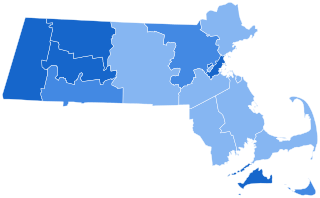
The 2012 United States presidential election in Massachusetts took place on November 6, 2012, as part of the 2012 United States presidential election in which all 50 states plus the District of Columbia participated. Massachusetts voters chose 11 electors to represent them in the Electoral College via a popular vote pitting incumbent Democratic President Barack Obama and his running mate, Vice President Joe Biden, against Republican challenger and former Massachusetts Governor Mitt Romney and his running mate, Congressman Paul Ryan.

The 2000 presidential campaign of Alan Keyes, former Assistant Secretary of State for International Organization Affairs from Maryland began when he formed an exploratory committee, simply called Keyes 2000, on June 17, 1999, with a formal announcement on September 21, 1999 in Bedford, New Hampshire. He ran in the 2000 presidential primaries, opposing Texas governor George W. Bush and Arizona Senator John McCain for his party's nomination. Keyes campaigned as a more ideologically consistent candidate than John McCain, taking right-wing positions on issues, including abortion, gun control, and government spending.

Below is a detailed tally of the results of the 2020 Republican Party presidential primary elections in the United States. In most U.S. states outside New Hampshire, votes for write-in candidates remain untallied.

The 2004 Illinois Republican presidential primary was held on March 16 in the U.S. state of Illinois as one of the Republican Party's state primaries ahead of the 2004 presidential election. 73 delegates to the 2004 Republican National Convention were allocated to the presidential candidates.

The 2000 Illinois Republican presidential primary was held on March 21 in the U.S. state of Illinois as one of the Republican Party's statewide nomination contests ahead of the 2000 presidential election. 74 delegates to the 2000 Republican National Convention were allocated to the presidential candidates.
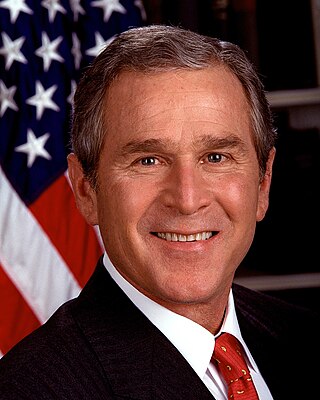
The 2000 South Dakota Republican presidential primary took place on June 6, 2000, as one of five final primaries on the same day in the Republican Party primaries for the 2000 presidential election. The South Dakota primary was a closed primary, with the state awarding 22 delegates to the 2000 Republican National Convention, of whom all 22 were pledged delegates allocated on the basis of the primary results.

The 2004 North Dakota Republican presidential caucuses were held on February 3, 2004, as part of the 2004 United States Republican Party primaries for the 2004 U.S. presidential election. 26 delegates to the 2004 Republican National Convention were allocated to the presidential candidates, the contest was held alongside primaries in Missouri and Oklahoma.

The 2004 Massachusetts Republican presidential primary was held on March 2, 2004, as part of the 2004 Republican Party primaries for the 2004 presidential election. 41 delegates to the 2004 Democratic National Convention were allocated to presidential candidates. The contest was held on Super Tuesday alongside primaries in Rhode Island. Although there were only two states organized, called it as "Mini-Tuesday".

The 2004 Rhode Island Republican presidential primary was held on March 2, 2004, as part of the 2004 Republican Party primaries for the 2004 presidential election. 18 delegates to the 2004 Republican National Convention were allocated to the presidential candidates.

The 2004 Oregon Republican presidential primary was held on May 18, 4, as part of the 2004 Republican Party primaries for the 2004 presidential election. 28 delegates to the 2004 Republican National Convention were allocated to the presidential candidates. The contest was alongside the Kentucky primary and Arkansas primary.
